Search the Special Collections and Archives Portal
Search Results
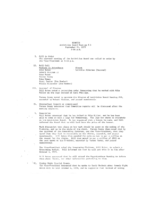
Meeting minutes for Consolidated Student Activities Board, University of Nevada, Las Vegas, September 25, 1978
Date
1978-09-25
Archival Collection
Description
Agenda and meeting minutes for the University of Nevada, Las Vegas Student Activities Board. CSUN Session 7 Meeting Minutes and Agendas.
Text
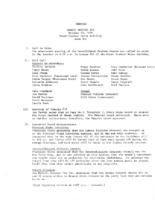
Meeting minutes for Consolidated Student Senate, University of Nevada, Las Vegas, October 10, 1978
Date
1978-10-10
Archival Collection
Description
Agenda and meeting minutes for the University of Nevada, Las Vegas Student Senate. CSUN Session 7 Meeting Minutes and Agendas.
Text
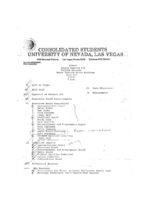
Meeting minutes for Consolidated Student Senate, University of Nevada, Las Vegas, February 09, 1982
Date
1982-02-09
Archival Collection
Description
Includes meeting agenda and minutes. CSUN Session 12 Meeting Minutes and Agendas.
Text

Meeting minutes for Consolidated Student Senate, University of Nevada, Las Vegas, July 12, 1983
Date
1983-07-12
Archival Collection
Description
Includes meeting agenda and minutes. CSUN Session 13 (Part 1) Meeting Minutes and Agendas.
Text
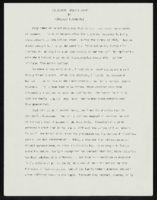
"Collecting Family History": article draft by Roosevelt Fitzgerald
Date
1988 (year approximate) to 1989 (year approximate)
Archival Collection
Description
From the Roosevelt Fitzgerald Professional Papers (MS-01082) -- Drafts for the Las Vegas Sentinel Voice file. On Black families in the United States and family reunions.
Text
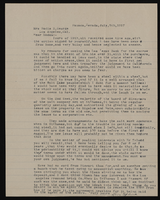
Correspondence, Levi Syphus to Sadie George
Date
1917-04-28
Archival Collection
Description
This folder is from the "Correspondence" file of the Sadie and Hampton George Papers (MS-00434)
Text

Transcript of interview with Jonathan Sparer by Stefani Evans and Claytee White, August 29, 2016
Date
2016-08-29
Archival Collection
Description
Jonathan “Jon” Sparer of Las Vegas, Nevada, is a retired architect who is active in the local Jewish and LGBTQ communities. He grew up on Long Island, New York, in the hamlet of Woodmere, where his father was an importer. After graduating in Architecture from Ohio State University in 1977 Jon moved to Los Angeles, California, where he worked first with architect Jack Chernoff, then with architect Bob Barnett until 1981, when he accompanied his future wife and college classmate who worked for Martin Stern to Las Vegas. Stern sent her to open a field office to supervise the reconstruction of the MGM Grand after it burned in November 1980. Once in Las Vegas, Jon began working for architect Homer Rissman on Steve Wynn’s future project, The Mirage. Although Jon switched firms, he continued working on The Mirage and other Wynn projects with Marnell Corrao, where he would stay until 2001. Ironically, Jon’s original supervisor at Marnell Corrao was his future husband, architect John R. Klai II; Klai’s subordinate in turn was Jon’s Spring Valley neighbor. After Jon left Marnell in 2001, he became a founding principal architect at YWS Design & Architecture. Although he has retired from full-time architecture, Jon has since designed the Temple for Congregation Ner Tamid (pictured above) and The Center (Las Vegas's gay, lesbian, bisexual, transgender, queer community center). Jon remains active in the AIA Las Vegas Chapter as the incoming president as well as serving as a board member for Jewish Family Services Agency and The Center.
Text

Transcript of interview with Juan Saa by David G. Schwartz, November 21, 2016
Date
2016-11-21
Archival Collection
Description
Juan Saa entered the gaming industry in information technology at Isle Casino Racing Pompano Park in Pompano Beach, Florida in 2006. Saa would later transition into performance manager and director of slot operations at two properties in Black Hawk, Colorado: Isle Casino Hotel Black Hawk and Lady Luck Casino Hotel Black Hawk. The interview begins with Saa’s discussion of his start in the technical side and his eventual move into an operational role in the casino industry. He talks about his experience as a director, specifically the responsibilities involved and the type of staff being supervised. Saa goes on to describe how both mentors and training have helped him to progress in his career. Saa also describes the differences in the technical and performance aspects of the industry, and he then provides his philosophy on what makes both a good and bad slot manager. Saa later discusses the importance in communicating with other departments in the casino, such as marketing and food & beverage, and he also provides his thoughts on what customers are looking for on the slot floor. He then describes what he believes are the biggest changes in the slot industry, specifically with TITO and slot analysis. The interview continues with Saa’s description of his interaction with vendors in bringing new games to the slot floor, and he describes his philosophy on how a slot floor should be laid out. He goes on to discuss what he believes the future of the slot floor will look like, specifically regarding skill-based games, and he describes his personal gambling. The interview finalizes with Saa’s advice to young people who want to go into the slot operations as a career.
Text
"Ralston Report" interview with Steve and Elaine Wynn: video
Date
2000-06-26
Archival Collection
Description
Steve and Elaine Wynn sit with Jon Ralston and Paula Francis for a special interview discussing plans to demolish the Desert Inn and build an 'indeterminate number" of new hotels. Talks about how the west side of the Strip has a "front" but no back (bordering the I-15 and Industrial Road, and while they are practical they are not aesthetically pleasing. The Desert Inn property, located on the east side, is off Paradise Road which is an important commercial street, and the Desert Inn property is on valuable property. Wynn explains how there is enough space for two Strip hotels, and located across from the high-end retail in Fashion Show Mall. Ralston asks why Wynn believes building north on the Strip is a good idea, and asks him if Wynn is worried about walk-in due to the area; Wynn is not worried at all about the location of these potential hotels. The reporters ask for details about the future ideas, but Elaine Wynn cautions against revealing too many details. He says the buildings will be close together, but not themed like other hotels and will have more natural lights. He talks about returning some water back into the Valley's water supply and create a "water stadium" with attractions from noon to midnight. Wynn discusses gaming appearing in other states like California, and what that means to Nevada gaming industry. The second segment shows select clips from the same interview. Original media VHS, color, aspect ratio 4 x 3, frame size 720 x 486. From the Stardust Resort and Casino Records (MS-00515) -- Photographs and audiovisual material -- Digitized audiovisual material file.
Moving Image
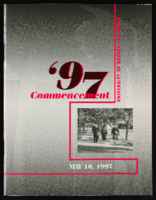
University of Nevada, Las Vegas (UNLV) 34th commencement program
Date
1997-05-10
Archival Collection
Description
Commencement program from University of Nevada, Las Vegas Commencement Programs and Graduation Lists (UA-00115).
Text
Pagination
Refine my results
Content Type
Creator or Contributor
Subject
Archival Collection
Digital Project
Resource Type
Year
Material Type
Place
Language
Records Classification
